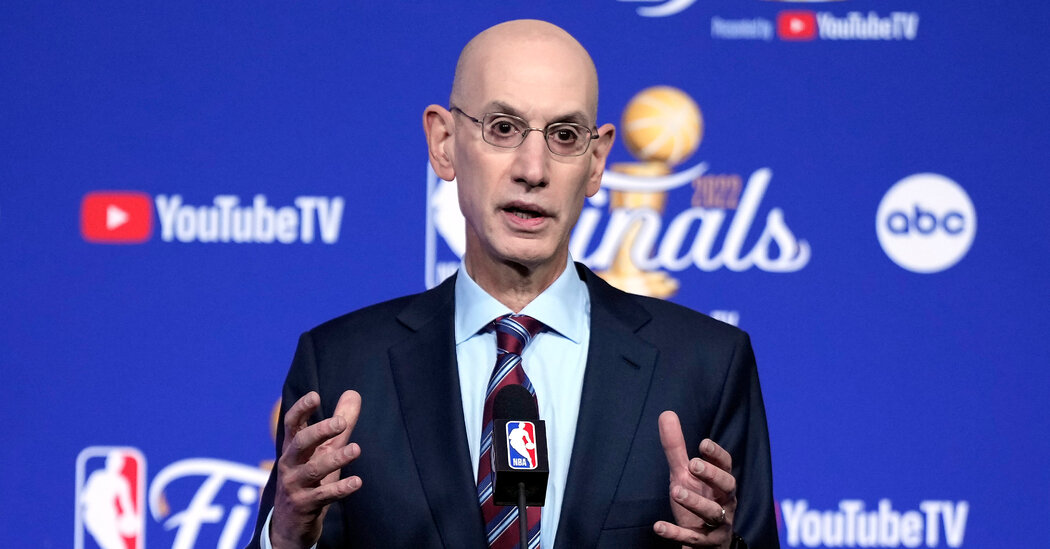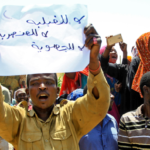
The N.B.A. is a $10 billion corporation that has the power and reach to promote not just its teams and players but to provoke discussion and debate around social issues. It has used that influence most prominently to fight racism in the United States.
Yet when it has come to Brittney Griner, the W.N.B.A. star who has been detained in Russia since February, the N.B.A.’s teams have been mostly absent from the public campaign for her release. The N.B.A. founded the W.N.B.A. and still owns about half of it, but the N.B.A. has been relatively muted outside of news conferences as Griner’s family, her agent and the women’s league and its players have led the public push for her freedom. N.B.A. players have also shown support.
Officials in both leagues said they had stayed quiet at first at the urging of U.S. government officials who worried that publicizing the case would backfire and jeopardize Griner even further. But even after the U.S. State Department said that it had determined she had been “wrongfully detained” and government officials began regularly speaking about Griner, the N.B.A. and team owners remained mostly quiet, fueling sentiments that the case has not gotten the kind of spotlight Griner’s supporters have demanded.
N.B.A. Commissioner Adam Silver has said publicly that the league and its teams are using their influence and connections to help Griner in ways the public doesn’t see. It is difficult to say whether they are doing enough when even experts in diplomacy disagree on what “enough” would be or if public or private advocacy would be more effective.
“There are no easy answers,” said Ian Bremmer, a political scientist who runs a political risk research and consulting firm. He added: “Could the N.B.A. have done more? Yes, they could have.”
On the other hand, Bremmer said, pressure from the N.B.A. could prompt Russia to ask for more in a deal to release Griner. Experts have suggested that a prisoner swap could free Griner.
“How you value all of those things depends on your perspective,” Bremmer said.
The N.B.A. players’ union said its members had been deeply concerned about Griner, and it pointed to players’ public shows of support at playoff games and award shows and on social media. Silver and W.N.B.A. Commissioner Cathy Engelbert have said that N.B.A. owners also care but have kept their advocacy out of the public eye. The New York Times contacted owners of all 30 N.B.A. teams — directly or through representatives — and none agreed to be interviewed about Griner.
Through a spokesman, Silver declined to be interviewed for this article, but in a statement he reiterated his public comments that the league had been “actively engaged” with government officials and experts.
“The N.B.A. and its teams are also using their influence to draw attention to Brittney’s situation, but ultimately this is a matter to be resolved by the United States government due to the serious and complex geopolitical issues at play,” Silver said in the statement.
The nuance of the league’s position isn’t lost even on those who are most intimately aware of what it means to be wrongfully detained abroad. Consider Jason Rezaian, the Washington Post opinion writer who was detained in Iran for a year and a half on spurious charges and freed in a prisoner swap in 2016.
He prepared to question Silver in June before the N.B.A. finals at a news conference, one of the few the commissioner gives in the season.
“I wanted to put him on the spot,” Rezaian said of Silver. “‘As a corporation, what are you doing for this employee of yours?’”
But before he got a chance, Silver beat him to it, saying that the N.B.A. and the W.N.B.A. were working with the U.S. government and outside experts to try to expedite Griner’s release. Rezaian said he thought that Silver’s remarks were forceful and that speaking about Griner before being asked had been smart.
“I thought it was wonderful that the commissioner used that moment of arguably his biggest platform of the year, or one of them, to call attention to the case,” Rezaian said. “If he can do that then, three and a half months into her detention, he could have done it earlier.
“But I know they were being advised against doing it earlier. I don’t blame anybody for that. There is not an official handbook to deal with what to do when your loved one or employee gets taken hostage by a hostile state.”
Griner, 31, has been detained since Feb. 17 after Russian customs officials said they found hashish oil in a vape cartridge in her luggage at an airport near Moscow. Her trial began July 1, and she pleaded guilty on July 7. She said she did not intend to break the law as she traveled to play for a Russian women’s basketball team during the off-season from her W.N.B.A. team, the Phoenix Mercury.
Her next hearing is scheduled for Tuesday. If she is formally convicted, which experts said had been likely even before she pleaded guilty, Griner could face up to 10 years in a penal colony. The U.S. State Department said it would work to negotiate her release regardless of the outcome of the trial.
Her public support has remained strong, despite her guilty plea.
“I get asked this question all the time — ‘Has the N.B.A. been helpful?’” Engelbert said. “Extremely helpful. We share a brand. We have N.B.A. after our name. N.B.A. team owners have reached out to me personally: ‘What can we do to help with Brittney?’”
Engelbert said that an N.B.A. owner had connected her with the Special Presidential Envoy for Hostage Affairs, a unit of the State Department that handles the cases of Americans deemed wrongfully detained, even before Griner had been given that designation.
Negotiations to secure the release of prisoners abroad are often conducted quietly. It is unclear what the N.B.A.’s role has been in applying pressure to government officials or assisting Griner’s family, but Engelbert said Silver had been personally involved in making phone calls to government officials on Griner’s behalf.
By the time the State Department announced it had determined that Griner had been wrongfully detained, the W.N.B.A. season was about to begin, but just eight N.B.A. teams were still competing in the playoffs.
“It takes a while to get to the realization that the person that you’re trying to influence is the president of the United States,” Rezaian said. “Because they’re the only one who’s in the position to make the kinds of concessions and decisions to make concessions that will free somebody.”
He added later, “People come home when it becomes politically costly for a president for them not to come home.”
The W.N.B.A.’s teams have honored Griner in many ways, including fund-raisers, court decals and T-shirts, and her family will still receive her full Mercury salary this season. Some N.B.A. players have spoken about her or worn clothing that drew attention to her detainment. The N.B.A.’s Phoenix Suns, who own the Mercury, added a decal to their court and have posted about Griner on their social media accounts, but few N.B.A. teams have made many vocal or public shows of support.
Experts are divided on the impact of public pressure. Some believe it worsens Griner’s situation by giving the Russian government more leverage in negotiations. One Russian official said the publicity around her case was creating “interference” in making a deal.
N.B.A. team owners have not been part of the public campaign. At a news conference during the summer league in Las Vegas this month, Silver said that Griner’s situation was not on the agenda during the league’s board of governors meeting but that individual owners had spoken to him about her.
The Times then contacted at least one owner from each team. Eleven representatives declined on behalf of owners, including one who would not even pass on the request. One spokesman said the team’s owner was on vacation, and 16 teams did not respond. Two owners responded directly.
“I can say that I have complete confidence that the N.B.A. and W.N.B.A. league offices are doing everything in their power,” Jeanie Buss, the controlling owner of the Los Angeles Lakers, said in a text message.
The Dallas Mavericks owner Mark Cuban declined to be interviewed but said by email, “I do hope she gets out soon.”
Five N.B.A. teams — in Phoenix, Brooklyn, Indiana, Minnesota, and Washington, D.C. — own W.N.B.A. teams. Owners for those teams declined to comment, but each of those W.N.B.A. teams has publicly supported Griner.
Engelbert said the N.B.A. had not asked team owners to avoid talking about Griner. She is part of the N.B.A.’s senior leadership team and reports to Silver.
“The suggestion has been to support the administration and the State Department in the work that they’re doing in this complex situation to get Brittney home,” Engelbert said.
Players have shown their support. During an N.B.A. players’ union meeting in May, Carmelo Anthony, a 10-time N.B.A. All-Star who spent last season with the Lakers, said the players should use the finals to highlight Griner.
On June 2, the day of Silver’s N.B.A. finals news conference, Anthony posted a video on Twitter of himself discussing Griner. He has 9.2 million followers.
“I wanted to use my voice to rally the basketball community,” Anthony said in a statement to The Times.
At an N.B.A. finals practice two days after Anthony posted his video, nearly every member of the Boston Celtics wore a black T-shirt with orange lettering that said “We are BG.” Grant Williams, a Celtics forward and vice president of the players’ union, had the shirts shipped overnight for his teammates.
Stephen Curry and LeBron James, two of the N.B.A.’s biggest stars, have also spoken publicly about Griner.
Tamika Tremaglio, the executive director of the N.B.A. players’ union, said she had been in contact with Terri Jackson, the executive director of the W.N.B.A.’s players’ union, since just after news broke of Griner’s detention about how N.B.A. players could help.
When the N.B.A.’s union leaders met in Las Vegas this month, they asked for an update. Jackson, who was at the W.N.B.A. All-Star Game in Chicago, recorded a video that was shown to the N.B.A. players.
“You could hear a pin drop,” Tremaglio said. “They were so pensive in terms of listening and hearing and understanding what was happening. It is something that we as a union also support the women. This is something we were critically concerned about, too.”
Rezaian said public displays of support are important.
During his 544-day detention in Iran, some of his most hopeful moments had come when he had heard that people were speaking about him, whether it was someone from The Washington Post or President Barack Obama.
“That sort of thing just floods you with a sense of being alive and also of power,” Rezaian said. “The walls might be up around you, and you can’t break them down, but you’re still there. You still count. And people are doing what they can for you.”




